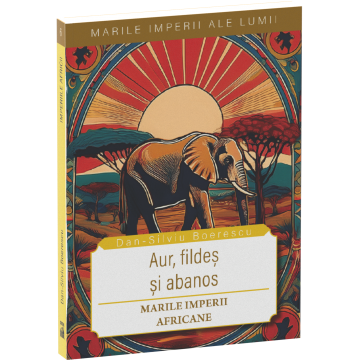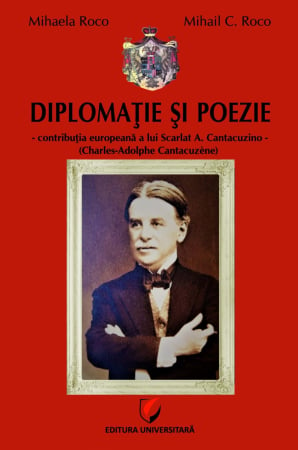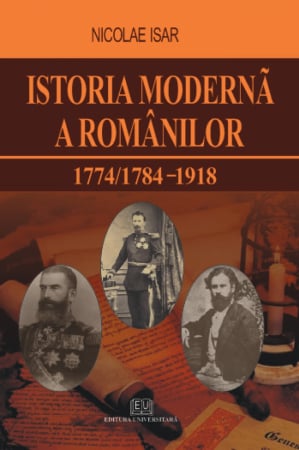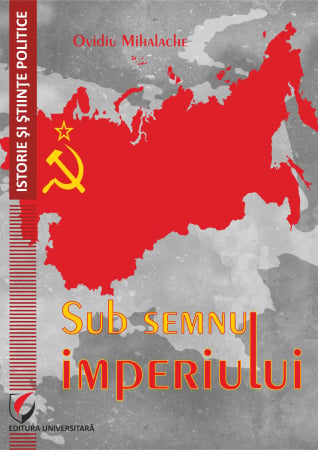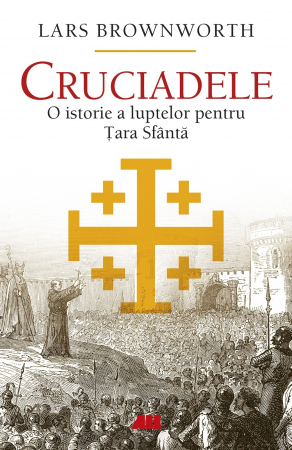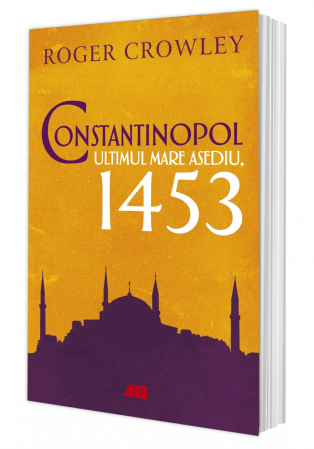ISBN: 978-606-28-0483-1
DOI: 10.5682/9786062804831
Publisher year: 2016
Edition: I
Pages: 210
Publisher: Editura Universitară
Author: Nicolae Isar
- Description
- Download (1)
- Authors
- Content
- More details
- Reviews (0)
The paper refers only to one of the hypostases of the politician, that of parliamentarian, senator during the most important conservative government from December 1891 - October 1895. It was a second interval of parliamentary activity after that, previously, of deputy. This senator's mandate was one in which the renowned politician, more than ever, valued, as a speaker, his exceptional quality of "sower of ideas".
This significant definition, in a few words, of G. Panu's personality and merits was first recorded on the base of his bust in the "Cismigiu" Garden erected by public subscription and made by a little-known sculptor today, Gh. Horvath (the same one who made the statue of Vasile Lascar).
This significant definition, in a few words, of G. Panu's personality and merits was first recorded on the base of his bust in the "Cismigiu" Garden erected by public subscription and made by a little-known sculptor today, Gh. Horvath (the same one who made the statue of Vasile Lascar).
Subsequently, this proper characterization was put into circulation in a 1933 study, belonging to a writer in the circle of his relatives, G.D. Anghel (G. Panu, Semanatorul de idei, published in the magazine "Libertatea", then separately).
Or, in this paper, reproducing the main speeches as a senator from 1892-1895, we aim to highlight the position of G. Panu as a sower of ideas regarding the modernization of Romanian society, on multiple levels, for which he he pleaded tirelessly, with talent and patriotic ardor, in these years, transforming the tribune of the Romanian Parliament into a means of irradiating ideas in public life.
But Panu was not only an important politician, recognized as such by his contemporaries, but he also distinguished himself in other aspects: as a journalist, full of verve and polemical spirit, as a jurist, of great reputation, as a writer and literary critic, well known. as the main author of "Memories" from Junimea, finally, of history, a field in which, it is true, he did not fully succeed.
With a complex personality, with an unstoppable energy, spread in a multitude of activities, the biography of G. Panu, over time, until today, could only be partially reconstructed, the studies that were dedicated to him, by usually, going on aspects or sides of his activity and personality. However, there is a larger work, originally a doctoral thesis, which was published in 1987, entitled Gh. Panu and Romanian radicalism in the late nineteenth century, authored by Corneliu Mateescu.
For the reconstruction of G. Panu's life and activity, other contributions of smaller or larger dimensions remain useful, without a doubt, some of them being memories, belonging to some of his relatives. Besides C.D. Anghel, already quoted, should be sent here to Const. Bacalbasa, Calistrat Hogas, Gr. Tocilescu, Caroni-Chilom s.a .; among the closest authors in time, Marin Radulescu, Al. Sandulescu, Alex. Leon, Paraschiva Cancea, Ion Bulei s.a. Also interesting are the punctual analyzes or references to G. Panu from the monographs or syntheses regarding the political life or history of the Parliament, belonging to some historians specialized in the modern history of Romania, such as Anastase Iordache, Paraschiva Cancea, I. Bulei, M. Iosa, N Isar sa
Even if, as I mentioned, an extensive work of analysis on the life and personality of G. Panu is still to be expected, as we see, there is still a minimal bibliography on G. Panu, which those interested can consult.
-
George Panu, promotor al modernizarii. Discursuri in Senatul Romaniei (1892-1895)
Download
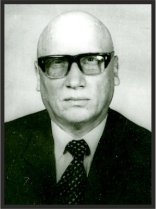
University Proffesor Doctor NICOLAE ISAR was born in 1937, in the town of Slanic-Prahova. Graduate of the Faculty of History of the University of Bucharest in 1962, then teacher in this faculty, going through all university levels, from preparator to full professor (in 1995). Doctor in history since 1973, doctoral supervisor since 1997. Consultant professor since October 2007.
Specialist in the modern history of Romanians, having as priority research directions the history of education and culture, the history of institutions, etc.
He is the laureate of two scientific awards of the Romanian Academy: “N. Iorga ”, 1985; "N. Balcescu ”, 1993.
He has published over 50 books and over 100 studies in journals. Among the books we mention:
- French publicists and the Romanian cause (1834-1859), 1991 ("N. Balcescu" Prize of the Romanian Academy for 1993);
- National School of St. Sava and the spirit of the time (1818-1859), 1994;
- The Romanian Principalities in the Age of Enlightenment (1770-1830), 1999 and 2005;
- Under the sign of romance. From the ruler Gh. Bibescu to the writer Simeon Marcovici, 2003;
- National culture and European spirit. From Gheorghe Lazar's school to the University of Bucharest (1818-1864), 2004, 2014;
- French testimonies and concerns about Romanians. XVIII-XIX centuries, 2005;
- From the history of the generation from 1848. Revolution, exile, historical destiny, 2006;
- Modern history of the Romanians (1774 / 1784-1918), 2006;
- Under the sign of the Lights. Figures from the era of 1821, 2006;
- The doctrine and the junimist-conservative legislation in the debates of the Romanian Parliament (1891-1895), 2007;
- Nicolae Iorga in defense of the memory of the ruler Alexandru Ioan Cuza, 2007;
- The revolution of 1848 in the Romanian Lands. With a study on the personality of N. Balcescu in his vision N. Iorga, 2008;
- From the political history of the Romanian Principalities. De la Fanarioti la Domniile nationale (1774-1829), 2008;
- From orthodoxy to national revival. The life and work of Eufrosin Poteca (1787-1858), 2008;
- Great Romanians in the vision of Nicolae Iorga, 2009;
- Romania under the sign of modernization. From Alexandru Ioan Cuza to Carol I (1859-1914), 2010, 2017;
- The memory of the Pasoptist exile. Alexandru Christofi in correspondence with Christian Tell (1852-1856), 2010;
- A history of the Roman Principalities. From political emancipation to the Union (1769-1859), 2010, 2016;
- Christian education and morals. The life and work of Simeon Marcovici (1802-1877), 2010;
- Emancipation and modernization of the Romans (1848-1918). Historical studies and readings, 2012;
- School and the Church in the Romanian society (1800-1914) - Studies -, 2012.
- 1848 in Tarile Romane. - Studies, 2013;
- 1821. The revolution and the spirit of the time. Synthesis and studies, 2013;
- From the history of Romanian social-political thinking (XVII-XIX centuries). Studies, 2013;
- Church-State-Society in modern Romania (1821-1914) - Synthesis and collection of documents, 2014;
- The founders of the Romanian law school. Speeches and writings prior to the Union of Principalities (1851–1859), 2016;
- From Eminescu to Nicolae Iorga. In defense of the memory of Prince Al. I. Cuza and M. Kogalniceanu, 2016;
- Gheorghe Panu, promoter of modernization. Speeches in the Romanian Senate (1892-1895), 2016;
- Prince Gh. Bibescu - Travel and "working visits", 2016;
- The Pasoptist era in French testimonies. Studies, 2017;
- The model of the apostolate. Teachers from "St. Sava”, 2017;
- Romanian-French relations and interferences in the Age of Enlightenment (1769-1834). Studies, 2017;
- Historical evocations. 1821-1918, 2018;
- Gheorghe Lazar and his school in memorable evocations, 2018;
- Nicolae Balcescu - The spiritual evolution of a great novel - with comments on his correspondence and writings, 2019.
- Important personalities in the vision of Nicolae Iorga. From Gheorghe Lazar to Mihail Kogalniceanu, 2019.
[Introductory study] / 5
II. Conservative legislation in the debates of the Romanian Parliament (1892-1895) / 16
1. Debates on the organization of school and church (1893) / 16
2. Debates in the field of organizing the administration (1892-1894) / 24
3. Debates on the agrarian problem (1892-1893) / 32
4. The issue of industry development; debates on the Mining Law (1895-1893) / 39
III. Speeches of G. Panu on the draft conservative laws (1892-1895) / 47
1. Speech to the Law of primary and primary-normal education (1893) / 47
2. Discourse on the Law of the lay clergy and seminaries (1893) / 70
3. Speech regarding the modification of the law of the County Councils / 90
4. Discourse on the organization of urban communes (1893) / 122
5. Speech to the Law on amending the sale of state property to peasants (1892) / 147
6. Speech on the amendment of the law on agricultural bargains (January 1893) / 158
7. Speech to the Agricultural Credit Law (1892) / 175
8a. Excerpt from the Mining Law Speech - (1895) [beginning part] / 191
8.b Excerpt from the Mining Law speech [final part] / 197
Addendum
George Panu, THE UNIVERSAL VOTE, [Bucharest, 1893] / 209
Born in March 1848 in Iasi, G. Panu, in his childhood and adolescence, benefited from the cultural atmosphere of the city, from its intellectual values. He did his primary school at Trei Ierarhi, the high school course at the Mihaileana Academy, then the Faculty of Letters in the recently founded University of Iasi, which he graduated in 1869, from this date dedicating himself to a teaching career (as a professor at "Alexander the Good" high school).
Interesting for analysts are his political options in these years, as a pupil and student, as well as other young people of the same age, being attracted especially by the Barnaut current, promoted by the "Free and Independent Fraction", led by Prof. Nicolae Ionescu. It detaches at some point, to some extent, the atmosphere of this current, which, among other things, rises against the idea of the foreigner, approaching the circle of "Junimii", attracted by the reputation of its owners, led by Titu Maiorescu and P.P. Carp. Although structurally, difficult to influence, here, he knows the fruits of participating in the meetings of "Junimii", publishing in the pages of the magazine "Convorbiri literare", in 1872-1874, his first studies - history studies - to which the options were initially directed. his scientific studies (first, Studies on the political hanging or non-hanging of the Romanians in special times, then, the Study of the history of the Romanians). They were historical attempts with critical arrows at the work of B.P. hasdeu - famous scholar at the time - who proved the courage and critical spirit of young Panu, giving him, at the same time, a beginning of notoriety in public life. A new stage enters Panu's biography with his reference to studies in the West, at the recommendation of Titu Maiorescu, who became Minister of Cults and Public Instruction (1874-1876). Arriving in Paris, in 1875, he attended the École de Hautes Études, which he did not complete, in order to travel to Brussels, where he followed the courses of the Faculty of Law, which he completed with a doctoral thesis in law.
In the West in these years of studies, 1875-1879, G. Panu was receptive to the socio-political currents aimed at expanding democracy and, at the same time, the interest for the lower classes of society (in this sense, it would explain the discussed affiliation of to the Socialist International I).
In any case, his proximity to the Liberal-Democratic leader C.A. Rosetti, who was in Paris for a time on the eve of the War of Independence. The republicanism of the liberal leader - later refuted for reasons of political opportunity - as well as the radicalism of his ideas, the option for deep reforms in the democratic sense, went to G. Panu's heart, and would become constant elements throughout his political activity.
Returning to the country in 1879, with this definitive orientation towards a radicalism that will be placed to the left of Romanian political life - but which will not go so far as to be confused with the program of socialist circles, which were beginning to assert themselves -, through CA Rosetti, G. Panu establishes links with I.C. Bratianu, at the same time moving even further away from "Junimea" and its leaders, although, morally, remains indebted to Titu Maiorescu.
The aftermath of the War of Independence - during which Panu was abroad - marked a series of innovations in public life in Romania, starting with the political ones: the National Liberal Party, founded in 1875, is in power for a long time (until 1888); the conservatives, after leaving the government (1871-1876), define themselves as a political party preparing for opposition; the monarchy was consolidated in 1881, Romania becoming a Kingdom. For a period of more than a year (April 1880 - June 1881) with the recommendation of the liberal government, in power, G. Panu became chief prosecutor in Iasi; at the same time, with the appearance of the newspaper "Liberalul", in November 1880, he was part of the editorial board and became a collaborator of it. It was an orientation encouraged by his close ties with the philosopher Vasile Conta, who became a minister in the government led by I.C. Bratianu (1880).
It is easy to explain, in this context, his close collaboration with C.A. Rosetti, whose chief of staff he became, with his entry into the government as interior minister (1881). He supported his initiatives in the direction of expanding democracy in Romania, from 1883 becoming a deputy in the Chamber of Revision of the Constitution and entering the Rosettista dissent against I.C. Bratianu, who proved to be on the path of authoritarianism and a moderate liberalism, unacceptable, not even for C.A. Rosetti, nor for G. Panu. In 1884, he resigned from the House, with the failure of the Rosettist group's proposals for democratic reform (primarily the single electoral college).
From this date it is constantly taking the path of opposition to the liberal government led by I.C. Bratianu, trying to define his own path under the sign of a democratic radicalism, especially as soon as C.A. Roseti will die (1885).
In his action, an important role was to be played by the newspaper "Lupta", founded in Iasi, in July 1884, which became the main organ of the opposition, especially after, in 1886, its editorial office was moved to Bucharest.
In this way, Panu becomes one of the main factors of the "united opposition", which groups liberal dissidents led by Dumitru Bratianu, the older brother of the prime minister, but also "young liberals", such as N. Fleva, Take Ionescu followed, he would soon switch to conservatives!), as well as conservatives of various shades, legal opponents of the liberal government.
In the midst of the overthrow of the Liberal government, the incident that will mark the evolution of G. Panu's life and political career occurs, namely the publication in the newspaper "Lupta", without his signature, of the article "The Dangerous Man" (April 1, 1887), with insults to King Carol I, an action that was in line with his old republican beliefs. The article was accompanied, even after the opening of the lawsuit filed against him, by several other articles of this kind ("An exploiter", "Royalty", etc.). A common element of these articles referred, in fact, to his previous protest in 1884, when the Liberal government, then Parliament, had granted the king the so-called "Crown domains" (an appreciable territory in the body of the country!).
As is well known, the trial of "les majestate" (April 1887) led to the author being sentenced to two years in prison. Or, advised by friends - some malicious! - G. Panu did not accept the execution of the sentence and fled to Paris, returning to the country at the beginning of the following year, in February 1888, after being elected deputy in the Second College of Iasi. As it is known, on the occasion of the validation of the mandates, and under the influence of P.P. Carp, the Chamber voted to suspend the sentence, in parallel with the pardon from the king. In any case, the flight to Paris, evading the execution of a court sentence, as I mentioned before, will remain in the public consciousness of the time and especially of King Carol I, who, as it is often written, "did not forgive this cowardice. ”(See Corneliu Mateescu, op. Cit., P. 73).
It must be said that the long liberal government led by I.C. Bratianu was impossible not to bear fruit, not only the public mentality, but, in a way, even the constitutional spirit demanding the alternation of power. It was obvious that the king had transformed I.C. Bratianu in a close collaborator, especially after, in 1883, he had concluded a secret alliance with the Central Powers. Or, the start of the opposition against the liberal government also affected the person of the king, who supported him.
Finally, the widespread turmoil of the opposition, with street movements that could lead to a state of disorder and anarchy, hard to stop, imposed on the king the decision to overthrow the liberal government and call the Conservatives to power. In a way, the sovereign was forced to take into account the "voice" of public opinion, even if in recent years, the "vizier" of I.C. Bratianu, the most important socio-economic reforms of the great liberal government had been adopted: the inauguration of a protectionist customs tariff in 1886, the adoption of the law for the protection and encouragement of national industry in 1887, completing the series of reforms opened in 1880 with the establishment of the National Bank. which were in line with the doctrine "by ourselves", promoted by IC Bratianu and his followers.
Therefore, in March 1888, a new Conservative government was formed, led by Theodor Rosetti. As the opposition to the overthrow of the Liberal government had been heterogeneous (with the participation of conservatives and many liberal dissident groups), understanding within the new beneficiaries of power proved difficult, which explained a new period of government instability until the end of the year. 1891; the government led by Th. Rosetti could only remain in power for a year, succeeding, until November 1891, three other governments with a heterogeneous composition (led successively by Lascar Catargiu, General Manu and General I. Em. Florescu). Finally, at the end of this time, a new government is installed in power, a structure that includes "pure" conservatives, followers of Lascar Catargiu, as well as the junimists led by P.P. Carp. This is the second conservative government in the history of Romania, lasting for almost four years (December 1891 - October 1895) and having under its leadership L. Catargiu, its program being given by the junimist group (hence the government name "L .Cargary - PP Carp ”).
Normally, these changes in political life could not but affect G. Panu, whom we see actively in the wake of these events, on the line of trying to form its own political party, radical-democratic, programmatically anticipated in 1888, with a material published in the newspaper "Lupta", but outlined as such, in the following years, especially after the installation in power of the conservative government L. Catargiu - PP Carp. An important moment on the path of G. Panu's radicalism was his speech in the Assembly of Deputies, - of which he had become a member - on November 21, 1888, in which he spoke about the causes of this year's peasant uprising.
This political line aiming at the establishment of a radical political party with the adoption of a program of reforms regarding the modernization of Romania in political, but also socio-economic plan, was strongly stated, especially after the installation in power of the government Carp. Following the elections of February 1892, the Assembly of Deputies and the Senate were to open their proceedings on February 24, by reading the Royal Message.
The Assembly of Deputies elected as president General Manu, who would remain in this position throughout the Conservative legislature, and the Senate on Gh. Gr. Cantacuzino, who will also remain in this position throughout the Conservative government.
As we will see in a separate chapter - the next chapter - criticisms of conservative legislative initiatives will allow G. Panu to assert his position on the main issues of the time. His plea in recent years for the modernization of Romanian society in socio-economic and political terms was remarkable, it was combined with the activity of journalist, the newspaper "Lupta", for another time, fully serving his ideas.
Here will appear numerous articles that are part of his democratic-radical vision on the development of Romanian society, such as, among others, the article - in fact a real study - entitled Universal Suffrage, which we see published in 1893 and in the brochure ( which we reproduce in the Addendum at the end of this volume)..
From the years 1892-1894, Panu's proximity to the Conservative Party is evident, in the socio-economic reforms promoted by the Minister of Domains, P.P. Carp, finding out the motivation for this approach; he found in them, if not an identity with his convictions, at least a tendency towards modernization, which, in these years, according to his opinions, he did not find in the liberals, who were in opposition. In line with this rapprochement, he finally reached the merger with the conservatives in 1897, after, in December 1895, the newspaper "Lupta", which had been the banner of his radicalism as an opposition newspaper, ceased to exist, Panu. starting his collaboration with the conservative newspaper "Epoca", led by Nicolae Filipescu.
As we know, unfortunately, his aspiration to become a minister with the help of conservatives, in this situation wanting to put his ideas into practice, would fail in the years 1899-1900, when, on the occasion the successive establishment of the two conservative governments, he was removed from the lists of proposals - either due to the opposition of King Carol I, or due to some conservative leaders, such as PP Carp or Tale Ionescu, who, although they appreciated his competence, anticipated the difficulty of collaborating with a politician with unacceptable ideas from a conservative point of view (more correctly, an explainable failure from both points of view).
It gradually followed, from 1901, especially with the founding of a new newspaper, "Saptamana", his return to the National Liberal Party.
t is the change that brought him the reputation of "route", even a symbol of the phenomenon, as the recently known historian, Ion Bulei, wrote.
More correctly, his failure to become a minister, to achieve a justified aspiration, must be explained by reference to the structure of political life in Romania in the late nineteenth and early twentieth century, which was dominated by the existence of the two major parties. , Conservative and National Liberal, representing the overlapping classes of society - a structure that, on the other hand, corresponded to the king's views and was supported in this regard. Under such conditions, the rise to power of some political formations - such as G. Panu's Radical Party - representing other social interests was not possible; they did not find their place in this structure, their time had not yet come.
G. Panu did not aspire to power out of a personal material interest, as was the case with many politicians of the time, but wanted, as I pointed out, to provide a platform to promote his ideas. in accordance with a competence he had fully demonstrated. Under the report of this aspiration, returned to the bosom of the liberals, he tries a new disappointment, failing to become a minister.
In the last years of his life, he will calm his bitterness in the pages of the magazine "Saptamana", where numerous and various materials appear attesting the encyclopedic character of his culture; here, among others, he published in series his memoirs from "Junimea", later, these forming two volumes, being the most important stories of this kind about the famous cultural-political society.
After a long suffering he will die on November 6, 1910, at an age when he could still have served the politics of time with great benefit.
After his disappearance, if not acts of government, his ideas remained, his vision of a modern society that would belong to the future.
Among his close contemporaries, C.D. Anghel would make a well-deserved portrait of him.
"The thread of this man's life was not straightforward, but all these political tribulations were not due to inconsistency, nor to any unsatisfied ambition to come to power.
t was rather the restlessness of a superior nature, embarrassed in a too narrow setting; the commotion of an eagle, enclosed in the bars of a cage of Oratans. It is not true that Panu was wanted after the ministry, but it is undeniable that he coveted a portfolio. What would be surprising?
He was a man aware of his value and it was natural, in the end, to want to give the helm the measure of his dexterity ".
Even in a work closer in time, from the years of communism, the author, Corneliu Mateescu, could only emphasize - within the limits of the censorship of the time - the value of G. Panu's work and personality, writing:
"Beyond its often contradictory inconsistencies, all the oscillations of a political career of over three decades, what cannot be challenged for Panu is the democracy of ideas, the desire to contribute to the prosperity of the country. The very desire to access the governmental bank is convinced that it must be connected with the sincere desire to make a concrete contribution in this direction ”(op. Cit., 1987, p. 188).
* * *
As we have shown, the quality of G. Panu as senator in the conservative government L. Catargiu - P.P. Carp, in the years 1892-1895, was the one who highlighted, first of all, his conception regarding the modernization of the Romanian society in socio-economic and political plan. His speeches in these years make up a real ideological treasure, it is a remarkable contribution to the history of Romanian socio-political and economic thinking, which deserves to be revealed.
We reproduce here, in the interest of researchers, but also of other informed readers, some of these speeches, grouped on four categories of problems: school and church; administration; agrarian problem; mining legislation.
The speeches of G. Panu, aiming at these fields of the evolution of the Romanian society, reproduced in the present volume, –- speeches occasioned by the projects of conservative laws, belonging to some politicians like P.P. Carp or Take Ionescu -, in advance, are commented by us starting from a series of works on the parliamentary life in Romania published some time ago (See the History of the Parliament and the parliamentary life in Romania until 1918, Edit. Academiei Romane, Bucharest, 1983, also our work, The doctrine and the junimist-conservative legislation in the debates of the Romanian Parliament, 1891-1895, University of Bucharest Publishing House, 2007.)

6359.png)
![George Panu, Promoter of Modernization. Speeches in the Romanian Senate (1892-1895) [1] George Panu, Promoter of Modernization. Speeches in the Romanian Senate (1892-1895) [1]](https://gomagcdn.ro/domains/editurauniversitara.ro/files/product/large/george-panu-promotor-al-modernizarii-discursuri-in-senatul-romaniei-1892-1895-553-627651.jpg)


